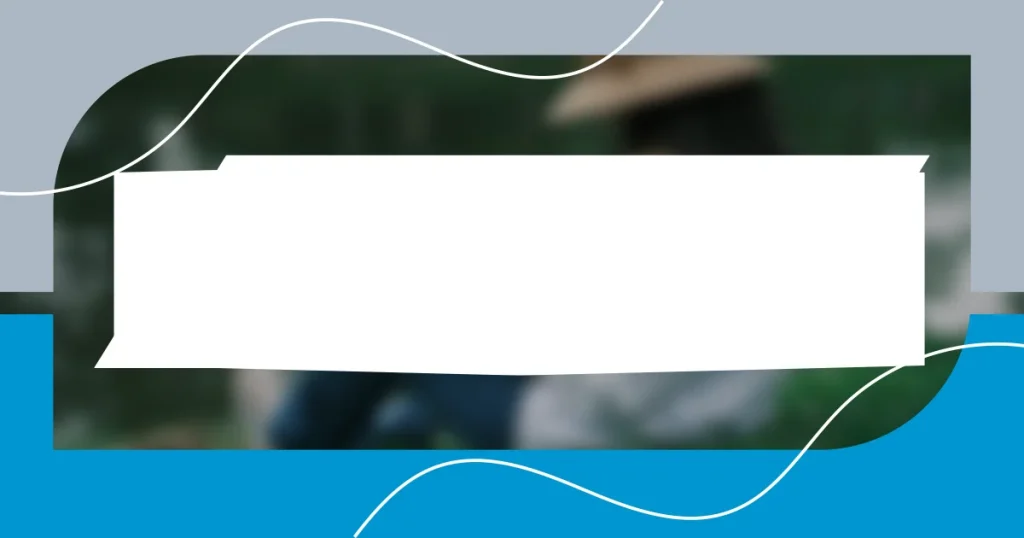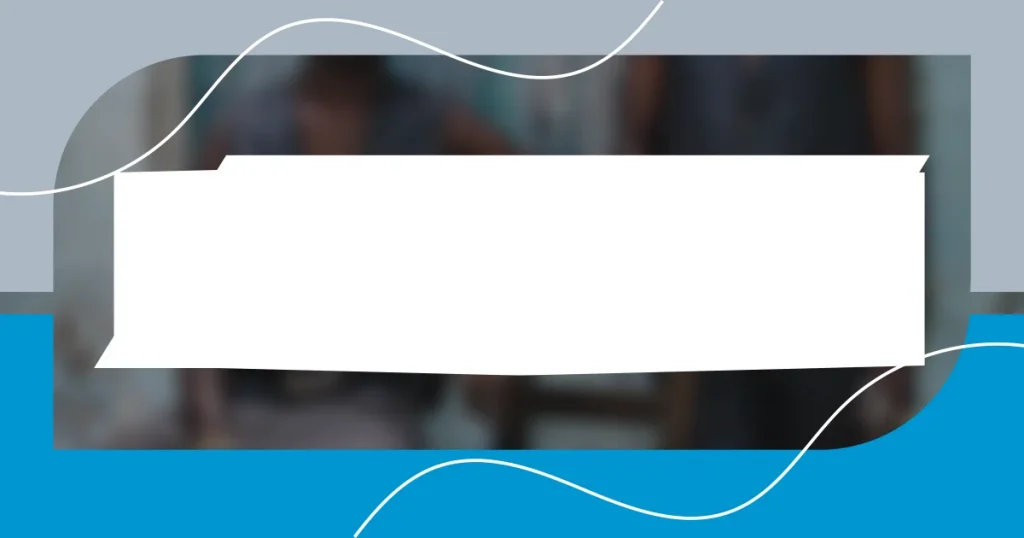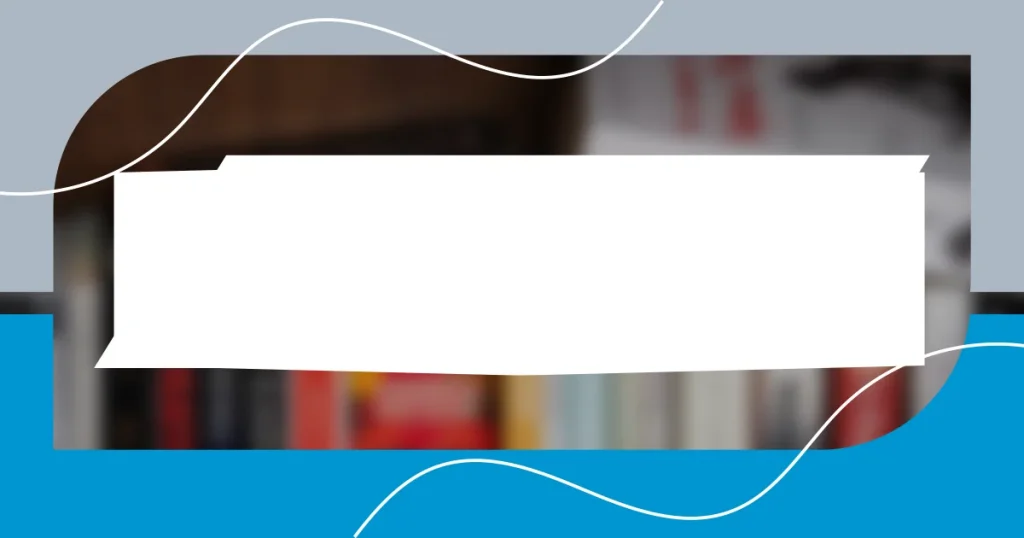Key takeaways:
- Understanding submission guidelines and aligning your work with specific prizes is crucial to avoid rejection and enhance your chances of success.
- A well-crafted cover letter that shares your writing journey and connects to your submission can significantly impact the judges’ perception.
- Embracing feedback and rejections as learning opportunities can lead to personal growth and improvement in your writing process.

Understanding Literary Prize Submissions
Diving into the world of literary prize submissions can feel overwhelming at first. I remember my first submission; it was a mix of excitement and dread. Who wouldn’t feel nervous about pouring their heart into pages, only to gamble with the possibility of rejection?
The submission process often requires a thorough understanding of each prize’s particular guidelines and preferences. I learned this the hard way when I submitted a piece that didn’t fit the theme of a competition I was aiming for. It’s easy to get lost in the metrics, but every detail plays a crucial role in standing out in a crowded field.
Having been on this journey, I now realize that the emotional weight of sharing my work through submissions can’t be understated. There’s a vulnerability in sending off a piece of yourself, akin to waiting for a friend to respond to a heartfelt letter. Have you ever experienced that rush of anticipation? It’s a rollercoaster of hope and anxiety, and I’ve found that embracing those emotions can actually enhance my writing and resilience in this competitive landscape.

Choosing the Right Literary Prizes
When it comes to choosing the right literary prizes, I’ve found that alignment with your writing style and genre is essential. For instance, I once submitted to a prize aimed at experimental poetry while my strengths lie in traditional narrative forms. It was a lesson in understanding my own identity as a writer; the result was predictable, but at that moment, it was eye-opening.
Here are some tips I’ve gathered along my journey that can help you select the right prizes:
- Know Your Genre: Research prizes that specifically honor your type of writing.
- Read Past Winners: This can give insight into what the judges favor.
- Check Submission Requirements: Ensure your work meets all criteria to avoid wasted efforts.
- Look for Values Alignment: Choose prizes that resonate with your own voice and themes.
- Consider Entry Fees: Weigh the cost of submission against the potential rewards.

Preparing Your Manuscript for Submission
Preparing your manuscript for submission is one of the most critical steps in the entire process. From my experience, I cannot emphasize enough the importance of following the specific formatting guidelines provided by each literary prize. The first time I submitted a manuscript, I overlooked the requested font and spacing. When I learned that my submission was immediately rejected for not fitting the required format, it felt like a punch to the gut. It’s a small detail, but it matters immensely.
As I refined my submission process, I also discovered the power of a professional critique. I once had a trusted friend read over a manuscript right before I submitted it. Their feedback revealed inconsistencies and plot holes I hadn’t noticed. It was a moment of clarity that ultimately transformed my work. Relying solely on my perspective limited my manuscript, but an external opinion helped elevate it to new heights. I can’t stress enough how valuable an objective set of eyes can be.
Lastly, I’ve learned that a strong cover letter can set the tone for the entire submission. I remember feeling nervous drafting my first cover letter; I wanted to showcase my personality without overshadowing the work itself. I now realize that a brief introduction and a hint of my journey as a writer can create a connection with the judges. It’s an essential part of the submission package that often gets overlooked.
| Tip | Description |
|---|---|
| Format Adherence | Follow the submission guidelines precisely regarding font, spacing, and length. |
| Seek Feedback | Get an external critique to identify issues you might have missed. |
| Craft a Compelling Cover Letter | Include your background and why your work fits the prize in your cover letter. |

Writing an Effective Cover Letter
Crafting an effective cover letter can feel daunting, but it’s a chance to articulate your unique voice. I recall my first submission; I was anxious and uncertain. Ultimately, I settled on a warm yet professional tone, briefly sharing my writing journey and how it intertwined with the theme of my submission. I felt the connection I established helped my work stand out in a sea of entries.
When it comes to content, keeping it concise is key. A cover letter doesn’t need to be a long essay; simply include relevant details such as your writing credentials, any previous accolades, or influences that inspired this particular piece. I once wrote too much, diluting my message, which ultimately distracted from the brilliance of my writing. Less truly is more in this context.
I’ve also found that personal touches resonate well with judges. Instead of projecting a list of achievements, consider sharing a brief story about what inspired your work or the emotions that fueled your writing process. I remember mentioning a specific moment that sparked my story idea, and I could almost feel the passion leap off the page. It made all the difference, enhancing the reader’s connection to both me and my writing. Have you thought about how your journey can add depth to your submission? It’s those little snippets that can linger in the minds of the judges long after they’ve read your letter.

Navigating Submission Guidelines
Navigating submission guidelines can feel overwhelming, but I’ve found that breaking them down into manageable components really helps. The first time I encountered a detailed set of instructions, I was nearly paralyzed with confusion. But as I began to systematically check off each requirement, I realized that the process wasn’t as daunting as it seemed. I learned the key is to focus, perhaps starting with one section at a time—be it the formatting, page length, or specific submission portals.
One memorable experience involved a prize that required not just adherence to tightly defined guidelines but also an online submission through a unique platform. I remember feeling lost amidst the unfamiliar process, like a tourist without a map. So, I spent a little extra time browsing forums and watching tutorials that guided me on how to use the site effectively. That proactive approach not only alleviated my anxiety but also ensured I didn’t miss any critical details. Has rushing through submission guidelines ever cost you a potential win? It’s frustrating to think about, but taking the necessary time can be a game changer.
Falling into the trap of assumption can be one of the biggest pitfalls when navigating the rules, something I know all too well. During one submission, I assumed my previous formatting wouldn’t be a problem for a different contest. Boy, was I mistaken! Instead of getting frustrated, I pivoted and learned to specify my format for each new prize—an indispensable lesson that helped align my approach moving forward. Keeping a checklist of requirements for each submission always ensures I’m meticulous, making the process more straightforward. How do you keep track of all those different rules? I have found that a simple spreadsheet or even a handwritten list can be a lifesaver in organizing submission details across multiple opportunities.

Common Mistakes to Avoid
When I first dipped my toes into literary prize submissions, I underestimated the importance of proofreading. I remember submitting a piece with a glaring typo in the first paragraph—such a rookie mistake! It felt like I had dropped a ball while juggling. Typos can undermine even the most poignant writing, so I recommend reading your submission aloud, catching those pesky errors and awkward phrases that might slip through when reading silently. Have you had a moment of cringe after spotting a mistake post-submission? It’s a lesson learned.
Another common pitfall is failing to tailor your work for specific competitions. Early in my journey, I submitted a story that was a personal favorite but didn’t resonate with the contest’s theme at all. The moment I received the rejection, I realized I had neglected to align my manuscript with the guidelines. Now, I always ask myself: “How does my work fit into their vision?” It’s a simple yet powerful question that can drastically alter your chances of getting noticed. Don’t let your favorite piece be sidelined due to a lack of focus!
Finally, I can’t stress enough the impact of a rushed submission. I once rushed to submit just before a deadline, only to realize I hadn’t double-checked the required formatting. It felt like running a marathon only to trip before crossing the finish line. Trust me, taking the time to ensure everything is perfect can make all the difference. Remember, a hasty submission can overshadow your creativity. What strategies do you use to manage your timeline? I’ve learned that starting early not only reduces stress but also allows for thoughtful revisions that can enhance my work’s potential.

Reflecting on Feedback and Rejections
Reflecting on feedback can be a double-edged sword. When I first received a rejection letter, I felt that familiar sting of disappointment. But looking back, each note—whether glowing or critical—offered a fountain of insights. For instance, one judge pointed out that my story lacked emotional depth. It wasn’t an easy pill to swallow, but it prompted me to dig deeper into my characters’ motivations in future pieces. Have you ever experienced growth from what seemed like a snub? I’ve found that feedback, notably the tough kind, often becomes the best teacher.
Rejections can be disheartening, but I’ve learned to reframe them as stepping stones rather than roadblocks. There was a contest where my work didn’t even get past the first round, which initially left me questioning my abilities. Instead of letting negativity fester, I turned to other authors for support and shared my experience. Surprisingly, many had similar stories and setbacks, which made me realize that rejection is just part of the journey. How do you cope with these setbacks? Personally, I find solace in writing new material that excites me, focusing on creativity rather than dwelling on missed opportunities.
In the aftermath of each rejection, I always remind myself that every piece submitted is an opportunity for growth. I remember a specific instance where I sent a draft that I had poured my heart into, only to receive a curt “not right for our publication.” Initially, it felt like a punch to the gut. But as I took a step back, I reassessed not just the piece, but my writing process. Did I truly connect with the audience? I began to view each rejection letter as a valuable checkpoint, guiding me to refine my craft. Isn’t it fascinating how the toughest experiences can lead to the most profound changes? By embracing these lessons, I feel more prepared for the next round of submissions.
















